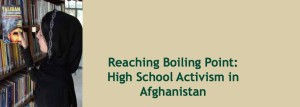AFGHANISTAN RESEARCH AND EVALUATION UNIT
Publication Announcement:
Date: 10.28.2015
There is widespread political activism, including an extensive presence of radical activists among high school students in Afghanistan, a new AREU study says.
This is despite a government ban on political activism in high schools, which in itself can be argued that is a relic of an authoritarian era.
The study reiterates that the lack of employment, a sluggish economy and dissatisfaction about the functioning of the Afghan educational system are major factors in the politicisation of high school students in Afghanistan, which also includes an attraction towards extremist groups.
While some students’ politicization and motivations towards joining political groups have their roots in the history of politics in their families, many seem to believe that without the protection of a political patronage network, they will not be able to gain good marks, be admitted into university, and eventually secure a good job.
The paper finds that radical groups who tend to sympathise with the insurgency to varying degrees, have been successful in attracting high school students. There is also evidence of some students being recruited to active insurgent groups like the Taliban, which is a relatively surprising development, given that in the early years of their insurgency the Taliban did not target high schools for recruitment.
Overall, with regard to the politicisation of high schools, the impression given is one of a pot under increasing pressure but that has yet to reach boiling point. Obvious manifestations of extreme student frustration, such as demonstrations and protests, are relatively rare and mostly on small-scale when they do occur. However, students seem to be drifting in the direction of widespread mobilisation and protests, particularly if the economy does not recover and employment opportunities do not improve.
The study reiterates that the on-going radicalisation of high-school students has not yet reached a critical point, where it could contribute decisively to the destabilisation of the country. However, rather than waiting for that to happen, the competent authorities should reconsider the effectiveness of their educational policies and, first and foremost, their ban on political activities in high schools.
The study notes that if the ban were to be revoked, at least there would be a more level playing field in high schools, allowing a greater variety of parties and organisations to compete for the loyalty of the younger generation. To date, the ban has primarily only been successful in keeping out moderate and progressive groups.
“Reaching Boiling Point: High School Activism in Afghanistan” is available for download.


